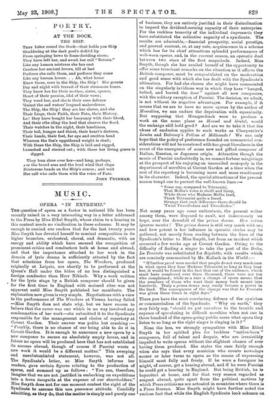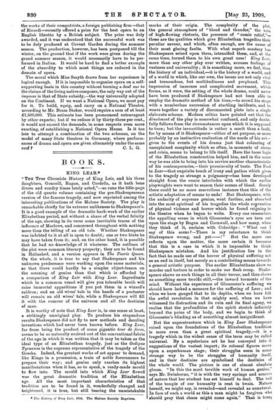MUSI C.
OPERA " IN EXTREMIS."
THE question of opera as a factor in national life has been recently raised in a very interesting way in a letter addressed to the Press by Miss Ethel Smyth, whose claim to a hearing in this context needs no vindication in these columns. It may be enough to remind our readers that for the last twenty years Miss Smyth has devoted herself to musical composition in its higher branches, orchestral, choral, and dramatic, with an energy and ability which have secured the recognition of prominent critics and conductors both at home and abroad, and that the importance attached to her work in the domain of lyric drama is sufficiently attested by the fact that selections from her opera, The Wreckers, produced originally at Leipsic, are shortly to be performed at the Queen's Hall under the Wan of no less distinguished a foreign conductor than Herr Nikisch. Why a work written for the lyric stage by a British composer should be given for the first time in England with maimed rites was not apparent until Miss Smyth published her manifesto. The explanation now given is very simple. Negotiations with a view to the performance of The Wreckers at Vienna having failed —Miss Smyth does not state why, but we have reason to believe that the cause was one which in no way involved any condemnation of her work—she submitted it to the Syndicate responsible for the management and choice of repertory at Covent Garden. Their answer was polite but crushing :- " Frankly, there is no chance of our being able to do it in Covent Garden. It is enough to announce a new opera by a new composer to secure an absolutely empty house, and in future no opera will be produced here that has not established its success abroad, though of course if Puccini wrote a new work it would be a different matter." This sweeping and unsubstantiated statement, however, was not all. The Syndicate's letter, so Miss Smyth informs her readers, gave certain figures relating to the production of operas, and summed up as follows : " You can, therefore, Imagine that we are not justified in embarking on expeditions into a terra incognita at the expense of our shareholders." Miss Smyth does not for one moment contest the right of the Syndicate to assume this non possumus attitude. Candidly admitting, as they do, that the matter is simply and purely one
of business, they are entirely justified in their disinclination to imperil the dividend-earning capacity of their enterprise. For the reckless temerity of the individual impresario they have substituted the collective sagacity of a syndicate. The results are admirable,—financial prosperity, social prestige,
and general content, or, at any rate, acquiescence in a scheme which has for its chief attractions splendid performances of well-worn operas, and, in the current season, an operatic duel between two stars of the first magnitude. Indeed, Miss Smyth, though she has availed herself of the opportunity to offer some trenchant remarks on the situation as it affects the British composer, must be congratulated on the moderation
and good sense with which she has dealt with the Syndicate's ultimatum. For had she chosen she might have commented on the singularly invidious way in which they have " banged, bolted, and barred the door" against all new composers, with the solitary exception of Puccini. The decision, we admit,
is not without its negative advantages. For example, if it means that we are to have no more operas by the author of Messalina, we can endure the deprivation with equanimity. But supposing that Humperdinck were to produce a work on the same plane as Hansel and Gretel, would the embargo still hold good ? And are we to take it that the ukase of exclusion applies to such works as Charpentier's Louise and Debussy's Pelleas et lifilisande ? We can only
hope that the policy of preference founded on commercial con- siderations will not be construed with too great literalness in the event of the emergence of some new and gifted composer of Italian, Russian, or Japanese origin. Attractive though the music of Puccini undoubtedly is, we cannot forbear misgivings at the prospect of his enjoying an unassailed monopoly in the department of novelties at Covent Garden at a time when the rest of the repertory is becoming more and more reactionary in its character. Indeed, the special attractions of the present season tempt one to pervert the well-known lines :-
" Some say, compared to Tetrazzini, That Melba's voice is shrill and tinny, While those who Madame Melba laud, Think Tetrazzini quite a fraud.
Strange that such difference there should be 'Twixt Tweedledum and Tweedledoe."
Not many years ago some enthusiasts, the present writer among them, were disposed to exult, not indecorously we hope, over the downfall of the prima donna. Heu vatum ignarae mentes ! The prima donna is still vary much with Us ; and how potent is her influence in operatic circles may be gathered, not merely from reading between the lines of the
Syndicate's letter to Miss Smyth, but from an incident which occurred a few weeks ago at Covent Garden. Owing to the
difficulty of finding a singer to take the part of the Duke, La Traviata was substituted for Rigoletlo, with results which are concisely summarised by Mr. Kaliech in the World :— "If further proof were needed that people do not very much care in what opera they hear Madame Tetrazzini as long as they hear her, it would be found in the fact that out of the audience, which must have numbered over three thousand, there were not ten who complained ; while as a rule a change of opera means that the numbers of those who want their money back mount into hundreds. Truly a prima donna may easily become a power in the land. The consequence of the change was that La Traviata was given three times in eight days."
There you have the most convincing defence of the cynicism or commercialism of the Syndicate. " Why on earth," they may fairly say, "should we put ourselves to the trouble and expense of speculating in difficult novelties when not one in three hundred of the opera-going public cares what opera they listen to so long as the right singer is singing in it ? "
None the less, we strongly sympathise with Miss Ethel Smyth in her spirited plea for luckless " native-born "
composers, full of talent and despair, who are irresistibly impelled to write operas without the slightest chance of ever having them produced. She states the case fairly enough when she says that every musician who counts nowadays sooner or later turns to opera as the means of expressing himself most fully and freely. If he were a foreigner he might, of course, get a hearing abroad, and if he were Puccini
he could get a hearing in England. But being British, he is boycotted at home, and for that very reason regarded as suspect abroad, quite apart from the political motives by
which Press criticisms are actuated in countries where there is a Press Bureau. Miss Smyth might have further noted the curious fact that while the English Syndicate look askance on the works of their compatriots, a foreign publishing firm—that of Ricordi—recently offered a prize for the best opera to an English libretto by a British subject. The prize was duly awarded, and it was understood that the successful work was to be duly' produced at Covent Garden during the summer season. The production, however, has been postponed till the winter, on the ground that if the work were given during the grand summer season, it would necessarily have to be per- formed in Italian. It would be hard to find a better example of the absurdity to which most things are reduced in the domain of opera.
The moral which Miss Smyth draws from her experience is logical enough. If it is impossible to organise opera on a self- supporting basis in this country without turning a deaf ear to the claims of the living native composer, the only way out of the impasse is that of State subsidy,—the way universally adopted on the Continent. If we want a National Opera, we must pay for it. To build, equip, and carry on a National Theatre, according to Mr. Bram Stoker, would require a sum of at least £1,500,000. This estimate has been pronounced extravagant by other experts; but if we reduce it by thirty-three per cent., it would not exceed the demands, in some respects even more exacting, Of establishing a National Opera House. Is it too late to attempt a combination of the two schemes, on the model of many State theatres in Germany, where perform- ances of drama and opera are given alternately under the same







































 Previous page
Previous page